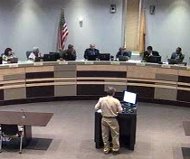11/24/2010
New Mexico: Photo Enforcement Locations See More Accidents, InjuriesAccidents increase by a quarter in areas where speed and red light cameras were used in Las Cruces, New Mexico.

The Las Cruces, New Mexico city council on Monday agreed once again to continue using a photo enforcement program that has proved to cause a significant increase in accidents. The jurisdiction in May reluctantly complied with a New Mexico Department of Transportation (NMDOT) order shutting down automated ticketing on state roads. Officials ignored the evidence at the time that accidents had increased, not decreased as promised, at photo enforced locations.
With even more complete collision data in hand, the case for the automated ticketing machines looks weaker than ever. Road accidents nationwide have reached historic lows, yet the overall accident rate increased 24 percent at monitored intersections in Las Cruces, the rate of injury accidents increased 29 percent and the rate of property damage accidents increased 25 percent.
The Valley Drive at Avenida de Mesilla camera and the north Main Street and Solano Drive camera were unplugged in May, so the city provided about fourteen months' worth of accident data before the devices were installed for comparison with another fourteen months of data up to their deactivation. Tickets have continued to flow at Lohman and Walnut Street, so twenty months of before and twenty months of after data are available. The total number of collisions at this location increased 18 percent and the number of injury collisions doubled.
City officials downplayed the significant accident increase by claiming "longer time periods are needed" to judge the effectiveness of the automated ticketing machines. A presentation created by Redflex Traffic Systems, the Australian vendor in charge of the camera program, argued that more tickets could be issued to boost program revenue. It cited an increase in speeding violations at the locations where the cameras were deactivated. The city finance department estimated that the cameras would generate $5,012,847 in revenue through fiscal 2011. Redflex locked the city into a contract that does not expire for another three years.


